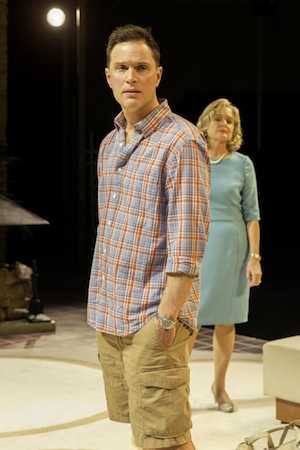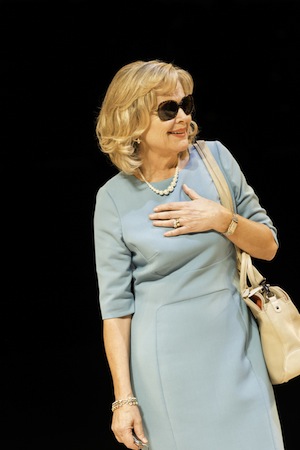As anyone who has watched their fair share of the saccharine muck that Hollywood churns out for the festive season will know, every single American Christmas takes place in New York. Christmas in California is just not right.
So you know you’re in for an uncomfortable watch when you take your seats at the Old Vic for the first play of their in-the-round season – and see a palm tree on the opposite side of the stage from a Christmas tree. John Robin Baitz’ Other Desert Cities is set on Christmas Eve in Palm Springs California. The set is arid and bare, with only a drinks’ cabinet and a Christmas tree to cover its nakedness. Even before the play starts it establishes an unspoken discomfort and unease- something which remains throughout the play.
The drama follows the Wyeth family during the festive holiday; the head of the family is Lyman Wyeth (Peter Egan), a former Hollywood star turned Republican grandee and US Ambassador to Mexico. His wife, also a Republican Party socialite, is Polly Wyeth (Sinead Cusack), who wrote a series of MGM comedies in the 60s. Together they appear to have the perfect life. We meet the couple as they jovially finish up a morning game of mixed doubles with their grown-up children. They wear fine clothes. They go to nice restaurants. They can afford to have their Republican values. But, in spite of this ostensible perfection we’re soon aware that all is not what it may seem.
To start with their grown-up children don’t live up to their investment or expectations. Their son Trip (Daniel Lapaine) is a daytime TV producer educated at Ivy-League schools. The show he produces, extracts entertainment from the misfortune of the impoverished. He’s a porn addict, who “smokes too much weed”, and can’t hold down a serious relationship. “What else is there to life? Apart from being funny,” he quips at one point. Put pretentiously, he is the essence of post-modern man.
 But Trip is not the cause of the family’s disquietude. No, his hedonistic apathy can only ever reinforce the status quo. Instead it is his sister, Brooke, a depressive writer who escaped her Californian family for the “more real” East Coast. It is Brooke’s East Coast cynicism and desire for the ‘truth’, her hubris, which unravels both her, and her family. The family have an uncomfortable secret which Brooke has published in what is her first book since checking out of a mental health clinic for her depression. For Brooke this public divulgence of the family’s skeleton-in-the-closet promises a cathartic release.
But Trip is not the cause of the family’s disquietude. No, his hedonistic apathy can only ever reinforce the status quo. Instead it is his sister, Brooke, a depressive writer who escaped her Californian family for the “more real” East Coast. It is Brooke’s East Coast cynicism and desire for the ‘truth’, her hubris, which unravels both her, and her family. The family have an uncomfortable secret which Brooke has published in what is her first book since checking out of a mental health clinic for her depression. For Brooke this public divulgence of the family’s skeleton-in-the-closet promises a cathartic release.
For her parents, however, this disclosure is a frightening idea. They claim it threatens to undermine who they are, and what they stand for. They feel betrayed by their own daughter. They believe it undermines the family unit, and that Brooke’s desire for transparency willingly ostracizes her from that unit. And so it is through Brooke’s wide-eyed attempts to uncover the “truth” that we are exposed to a family drama which explores the authenticity of truth, postmodern culture, and contemporary American politics.
Politics, in particular, is very close to the surface of the play’s family drama. The family offers a microcosm of the American political spectrum, with Brooke’s liberal, East Coast sentiments starkly contrasting her parents’ Republican values. But more interesting is how Baitz uses the parents’ Republican affiliations to remark on the American Neo-conservative obsession with fear. The parents are afraid of the truth. They fear the disclosure of the truth, they sell their children lies, and use fear to force these lies on them.
 Is their attitude moral? We’re never sure. The writing is far too mature to land a punch on any side of the political spectrum. Baitz is a grown-up playwright who is fully aware that things are more complex than they may seem. In political drama you want to land punches. You want youthful optimism or wizened cynicism. If you want to see Other Desert Cities as a political drama, then it fails to excite. This mature writing produces a drama which is perhaps too profound to really get the blood going on an intellectual level.
Is their attitude moral? We’re never sure. The writing is far too mature to land a punch on any side of the political spectrum. Baitz is a grown-up playwright who is fully aware that things are more complex than they may seem. In political drama you want to land punches. You want youthful optimism or wizened cynicism. If you want to see Other Desert Cities as a political drama, then it fails to excite. This mature writing produces a drama which is perhaps too profound to really get the blood going on an intellectual level.
At the heart of the play is a family conflict – and it is this very visceral family drama that compels, enthrals, and makes the play worth watching. It is brought to life by some fine performances, of course from Sinead Cusack and Peter Egan, but also from Martha Plimpton who is making her West-End debut. And with the in-the-round layout really heightening the on-stage claustrophobia, it is possibly the perfect production to kick off the Old Vic’s new in-the-round season.
Other Desert Cities at the Old Vic runs until 24th May. For more information, visit the website.





